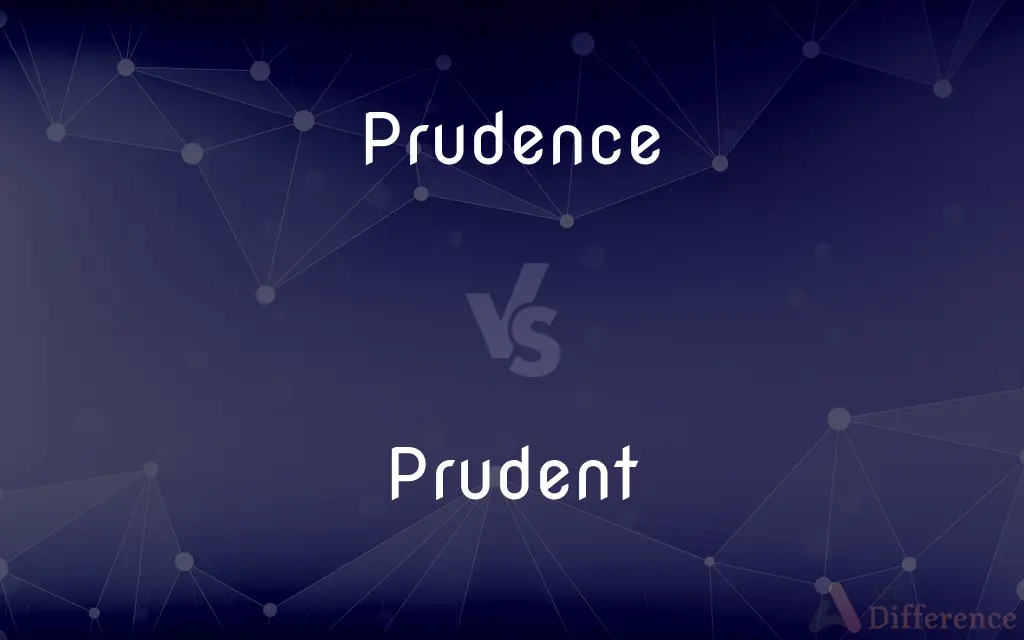Prudence vs. Prudent — What's the Difference?
By Urooj Arif & Fiza Rafique — Updated on April 3, 2024
Prudence is the quality of being cautious and wise in practical affairs, whereas prudent describes someone who exercises prudence in decision-making and actions.

Difference Between Prudence and Prudent
Table of Contents
ADVERTISEMENT
Key Differences
Prudence refers to the ability to govern and discipline oneself by the use of reason, especially in avoiding risks and recognizing the right time and measure in actions or decisions. It implies a careful consideration of future consequences and the best means to avoid harm or achieve good. On the other hand, a prudent person embodies this quality of mind or character, displaying it through their actions and decisions. They are often seen making choices that reflect a deep consideration of the outcomes, prioritizing safety, and long-term benefits over immediate gratification.
In philosophical and ethical discussions, prudence is considered one of the cardinal virtues, representing a moral and intellectual attribute that guides individuals toward ethical living. It involves not just foresight but also wisdom in choosing between virtuous and vicious actions. Conversely, being prudent is the manifestation of this virtue in practical scenarios. A prudent individual is recognized for their ability to apply ethical principles to everyday life, making decisions that reflect both moral integrity and practical wisdom.
In a financial context, prudence can be understood as the practice of being conservative in financial decisions and actions, prioritizing security and risk management. From this perspective, prudent investing or spending reflects an individual's application of prudential judgment, emphasizing careful risk assessment and avoidance of speculative ventures that could lead to substantial losses.
When it comes to interpersonal relationships, prudence involves being discerning about when and how to communicate, share information, or offer advice, considering the impact of one's words and actions on others and the relationship as a whole. A prudent person, therefore, is someone who navigates social interactions with careful thought and respect for the feelings and situations of others, often leading to more harmonious and constructive relationships.
Despite their close relationship, the distinction between prudence as a quality and being prudent as the expression of that quality in action highlights the depth and breadth of this virtue. It encompasses not only the foresight and wisdom in decision-making but also the ethical and practical application of those decisions in real-life situations.
ADVERTISEMENT
Comparison Chart
Definition
A virtue that involves wise decision-making and foresight.
Describes someone who exercises prudence.
Nature
Conceptual quality or virtue.
Personal characteristic or behavior.
Application
Broadly applies to decision-making processes and ethical considerations.
Specifically refers to an individual’s actions or decisions.
Focus
Emphasizes the importance of foresight and caution in various aspects of life.
Highlights the application of prudential judgment in practical situations.
Outcome
Aims for the achievement of good and avoidance of harm through careful deliberation.
Manifests in actions that are considered wise and cautious, reflecting careful thought.
Compare with Definitions
Prudence
The quality of being careful and avoiding risks.
Their prudence during the early stages of the project ensured its success.
Prudent
Wise in handling practical matters; exercising good judgment or common sense.
His prudent investment choices have yielded great returns.
Prudence
The ability to judge between actions with regard to appropriate actions at a given time.
Prudence dictates that we save money for unforeseen expenses.
Prudent
Cautious in conduct; not rash.
The company took a prudent approach to expansion.
Prudence
Consideration of the future consequences of one's actions.
Prudence is necessary in diplomatic relations.
Prudent
Reflecting prudence.
Her prudent advice often saved the team from making hasty decisions.
Prudence
A virtue that involves thoughtful decision-making and foresight.
Her prudence in investing her savings paid off in the long run.
Prudent
Acting with or showing care and thought for the future.
It was prudent of her to start an emergency fund.
Prudence
Wise or judicious in practical affairs.
The prudence of his approach to business has earned him respect.
Prudent
Careful in regard to one’s own interests; provident.
Being prudent with your resources can lead to long-term stability.
Prudence
Prudence (Latin: prudentia, contracted from providentia meaning "seeing ahead, sagacity") is the ability to govern and discipline oneself by the use of reason. It is classically considered to be a virtue, and in particular one of the four Cardinal virtues (which are, with the three theological virtues, part of the seven virtues).
Prudent
Acting with or showing care and thought for the future
No prudent money manager would authorize a loan without first knowing its purpose
Prudence
The quality of being prudent; cautiousness
We need to exercise prudence in such important matters
Prudent
Careful or wise in handling practical matters; exercising good judgment or common sense
A prudent manager of money.
Prudence
Careful or wise in handling practical matters; exercising good judgment or common sense
A prudent manager of money.
Prudent
Characterized by or resulting from care or wisdom in practical matters or in planning for the future
A prudent investment.
Prudence
Characterized by or resulting from care or wisdom in practical matters or in planning for the future
A prudent investment.
Prudent
Sagacious in adapting means to ends; circumspect in action, or in determining any line of conduct.
Prudence
The quality or state of being prudent
Prudent
Practically wise, judicious, shrewd.
His prudent career moves reliably brought him to the top.
Prudence
Economy; frugality.
Prudent
Frugal, economical.
Only prudent expenditure may provide quality within a restrictive budget.
Prudence
The quality or state of being prudent; wisdom in the way of caution and provision; discretion; carefulness; hence, also, economy; frugality.
Prudence is principally in reference to actions to be done, and due means, order, seasons, and method of doing or not doing.
Prudence supposes the value of the end to be assumed, and refers only to the adaptation of the means. It is the relation of right means for given ends.
Prudent
Sagacious in adapting means to ends; circumspect in action, or in determining any line of conduct; practically wise; judicious; careful; discreet; sensible; - opposed to rash; as, a prudent man; dictated or directed by prudence or wise forethought; evincing prudence; as, prudent behavior.
Moses established a grave and prudent law.
Prudence
Discretion in practical affairs
Prudent
Frugal; economical; not extravagant; as, a prudent woman; prudent expenditure of money.
Prudence
Knowing how to avoid embarrassment or distress;
The servants showed great tact and discretion
Prudent
Careful and sensible; marked by sound judgment;
A prudent manager
Prudent rulers
Prudent hesitation
More prudent to hide than to fight
Prudent
Showing wise self-restraint in speech and behavior especially in preserving prudent silence;
Maintained a prudent silence
Common Curiosities
How does a prudent person behave?
A prudent person behaves cautiously, with a strong emphasis on foresight, wisdom, and ethical decision-making in practical affairs.
Is prudence only about avoiding risk?
While prudence involves caution and risk avoidance, it also encompasses wise decision-making that balances risks with potential benefits.
Can someone be prudent without being ethical?
Prudence inherently involves ethical considerations, as it includes making decisions based on what is right and good.
What is prudence?
Prudence is the virtue of being wise and cautious in making decisions, emphasizing foresight and careful judgment.
How can one develop prudence?
Developing prudence involves cultivating wisdom, learning from experiences, and prioritizing ethical and thoughtful decision-making.
How does prudence affect financial decisions?
Prudence in financial decisions involves careful planning, risk assessment, and a conservative approach to investing and spending.
Is prudence innate or learned?
While some individuals may have a natural inclination towards prudence, it is generally considered a virtue that can be developed through experience and reflection.
Does being prudent mean avoiding all risks?
No, being prudent means carefully evaluating risks and making informed decisions that mitigate unnecessary risks while pursuing beneficial outcomes.
How does prudence relate to other virtues?
Prudence is often considered the "mother" of all virtues, as it guides the judicious application of other virtues such as courage, justice, and temperance.
Can prudence change with circumstances?
Yes, what is considered prudent can vary depending on the specific circumstances and the information available at the time.
Is prudence relevant in today's fast-paced world?
Yes, prudence remains highly relevant, as thoughtful decision-making and foresight are crucial in navigating complex and rapidly changing environments.
Can prudence be a drawback?
Excessive prudence can lead to missed opportunities; however, a balanced approach to prudence typically yields positive outcomes.
Why is prudence important in personal relationships?
Prudence is important in personal relationships as it guides individuals to make thoughtful decisions that consider the well-being and feelings of others, fostering trust and respect.
What is the difference between being cautious and being prudent?
Being cautious focuses on avoiding risk, whereas being prudent involves wise and ethical decision-making that includes risk assessment.
How does prudence influence leadership?
Prudent leadership involves making decisions that are ethical, wise, and considerate of future impacts, leading to sustainable success.
Share Your Discovery

Previous Comparison
Lawyer vs. Advocate
Next Comparison
Gigabit vs. MegabitAuthor Spotlight
Written by
Urooj ArifUrooj is a skilled content writer at Ask Difference, known for her exceptional ability to simplify complex topics into engaging and informative content. With a passion for research and a flair for clear, concise writing, she consistently delivers articles that resonate with our diverse audience.
Co-written by
Fiza RafiqueFiza Rafique is a skilled content writer at AskDifference.com, where she meticulously refines and enhances written pieces. Drawing from her vast editorial expertise, Fiza ensures clarity, accuracy, and precision in every article. Passionate about language, she continually seeks to elevate the quality of content for readers worldwide.















































